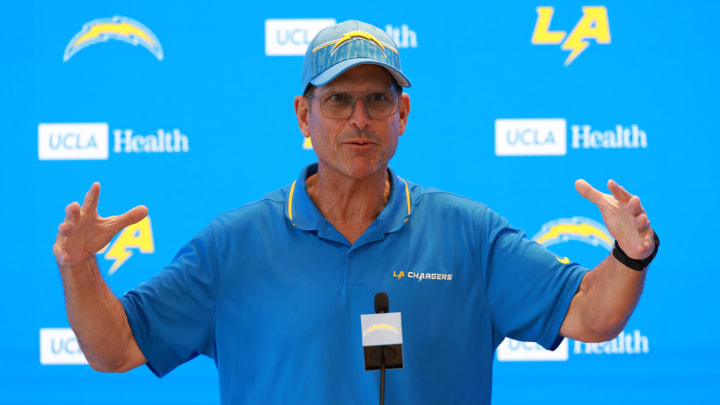Jim Harbaugh Thinks His Word is Golden, But the NCAA Doesn’t Agree

A day before he was banned from collegiate athletics until 2028 (for violations unrelated to the sign-stealing scandal that loomed over his final season with the Wolverines), Los Angeles Chargers head coach Jim Harbaugh made a denial of sign stealing so crystal clear, so devoid of legal vagaries providing him with an eventual out, that it’s hard not to consider for a second that he might be telling the truth.
Jim Harbaugh today on the reported NCAA notice of allegations: pic.twitter.com/N3NInSO8UP
— Daniel Popper (@danielrpopper) August 5, 2024
What’s interesting about the penalties issued Wednesday—essentially a deflated NCAA power move that allows them to show how serious they would be if another coach does this and fails to hit the eject button and leave for the NFL, knowing that Harbaugh will probably never come back to serve his suspension—is that the basis for the NCAA’s frustration seems to be Harbaugh’s brazen disregard for the truth. The NCAA’s findings include Harbaugh “outright denying knowledge” of infractions that college sports’ governing body found to be “not credible.”
And so we have these two ideas—Harbaugh invoking his father to underline his personal code of truthfulness and choir boy ethos; and the NCAA saying that they found similar assertions by Harbaugh during another investigation to be false—coming head to head just as Harbaugh is trying to re-establish a culture at the NFL level.
Getting players to buy in when you are not relatively young and not a former player and not in possession of a franchise quarterback who you can use as a mantle from which to tout yourself as some kind of transcendent genius is incredibly difficult. We’re watching Sean Payton in real time struggle to re-conjure the magic of New Orleans in Denver (surprise, without Drew Brees). Bill Belichick, like me, is spending this season podcasting and not coaching football. There came a time when Bill Parcells stopped instilling fear into the hearts of his players. Life moves on. Tastes change. Respect is earned perpetually and is, ultimately, a very fragile concept.
And, so, does Harbaugh’s schtick take a hit if he is found guilty in the court of public opinion on sign stealing—if such an aggressive and robust denial is found to contain holes?
A documentary featuring Connor Stallions, the alleged mastermind behind the Michigan sign-stealing operation, is set to come out on Netflix. Harbaugh’s replacement at Michigan, Sherrone Moore, deleted text messages from Stallions, according to the NCAA (and I would doubt that it was merely to save space against Apple’s infuriating cloud storage limit). Regardless of what can actually be pinned on Harbaugh, it’s not hard to see a mounting public case against the new Chargers coach take on enough steam to possibly undermine his assertion of innocence and, ultimately, what he is trying to accomplish at his new locale.
Not to belabor the point but think about how little it really takes for a coaching stalwart, an absolute legend, to get a bit of the wind taken out of their sails and lose that Vice Grip of control and expertise so critical to running an operation. Belichick made the playoffs for, like, two consecutive decades, made the playoffs again with Mac Jones as the quarterback, and then went 4–13 and was forced out. He’s now working this offseason to combat the belief that Tom Brady was the brains behind The Dynasty (even though Brady himself admitted it was a collaboration). Tom Coughlin won a pair of Super Bowls with the seriously undermanned New York Giants and was almost immediately turned upon. After a brief stint with the Jacksonville Jaguars as a personnel executive, he was swept out of football. Pete Carroll. Mike McCarthy. No armor in this social media age is impenetrable. No facade is uncrackable.
And, so, I think a lot about Harbaugh who is quite busy doing Harbaugh Things™. He’s flipping tires after practice. He was living in an RV next to his offensive coordinator. He’s espousing the slogans about enthusiasm unknown to mankind. He is classic Jim. It’s great. He’s also messaging not just to us, but his players, his staff, his bosses, his fans and everyone associated with the Chargers operation that his word is golden.
The NCAA clearly doesn’t think so. Take that with a grain of salt, of course given that college football management makes the NFL’s kangaroo-style disciplinary process look like the Supreme Court. What matters is whether we still believe Harbaugh when the inevitable rigors of an NFL season set in. When cynical players develop. When former coaches chatter. Absolute denial of wrongdoing is refreshing but if it’s found not to be so absolute, it could be devastating.
